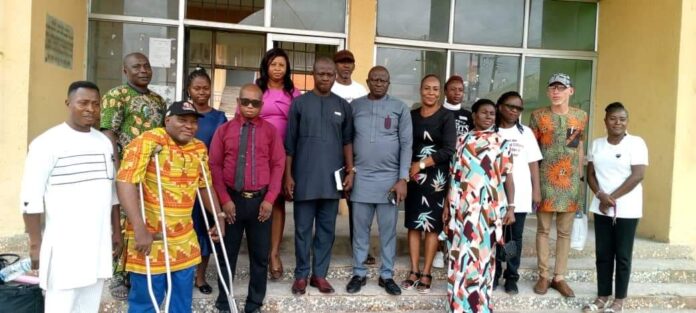Umuahia, July 12, 2024 – In a significant move towards inclusive governance, the Centre for Citizens with Disabilities (CCD) paid an advocacy visit to Dr. Sunny Jackson, the Executive Secretary of the Abia State Emergency Management Agency (SEMA). This visit, which aimed to present CCD’s groundbreaking Research Report on Disability-Inclusive Climate Change Adaptation and Mitigation, marks a pivotal step in integrating disability considerations into emergency and disaster management in Abia State.
Leading the CCD team, Mr. Damian Ivom, an esteemed advocate for disability rights, shared the comprehensive findings of their research. The report highlights the unique challenges faced by persons with disabilities in the context of climate change and disasters, emphasizing the urgent need for inclusive policies and practices. “Our research underscores the disproportionate impact of climate change on persons with disabilities. It is imperative that our adaptation and mitigation strategies are inclusive to ensure no one is left behind,” Mr. Ivom stated passionately.
During the meeting, Mr. Ivom detailed CCD’s previous collaborations with relevant Ministries, Departments, and Agencies (MDAs). These collaborations have laid a solid foundation for this new initiative, showcasing successful models of disability inclusion that can be replicated and scaled up across the state. The CCD’s track record of fostering partnerships and driving policy change has garnered respect and recognition from various stakeholders, making this advocacy visit a crucial step in the ongoing dialogue about inclusive disaster management.
Dr. Sunny Jackson, in response, expressed his commitment to this critical initiative. “We recognize the importance of inclusive disaster management and the valuable insights provided by CCD’s research. Abia State SEMA is dedicated to partnering with CCD to ensure our emergency response plans are accessible and effective for all citizens, including those with disabilities,” Dr. Jackson affirmed. His words reflect a promising commitment from the state’s emergency management authorities to prioritize disability inclusion in their planning and response efforts.
The significance of this visit extends beyond just a formal meeting. It represents a growing recognition of the intersection between disability and climate change, an area that has often been overlooked in policy discussions. By presenting concrete data and actionable recommendations, CCD is pushing for systemic change that can lead to more resilient and inclusive communities.
The project, which has received support from the Disability Rights Fund, is a testament to the power of collaboration and the impact of targeted advocacy. The Disability Rights Fund’s backing underscores the importance of funding initiatives that aim to bridge the gap between disability rights and climate action. Their support has been instrumental in enabling CCD to conduct thorough research and engage with key stakeholders effectively.
As climate change continues to pose significant challenges globally, the efforts by CCD in Abia State serve as a model for other regions. Integrating disability considerations into climate change adaptation and disaster management is not just a moral imperative but a practical necessity. It ensures that all citizens, regardless of their abilities, are protected and empowered to contribute to their communities’ resilience.
This advocacy visit marks the beginning of what promises to be a fruitful partnership between CCD and Abia State SEMA. By working together, they aim to develop and implement strategies that mainstream disability into emergency management, ultimately creating a safer and more inclusive environment for everyone.
The Centre for Citizens with Disabilities remains steadfast in its mission to promote the rights and inclusion of persons with disabilities across Nigeria. Their work in Abia State is a shining example of how dedicated advocacy, supported by robust research and strategic partnerships, can lead to meaningful change. As the world grapples with the realities of climate change, initiatives like these highlight the critical importance of inclusivity in building resilient and sustainable futures for all.


